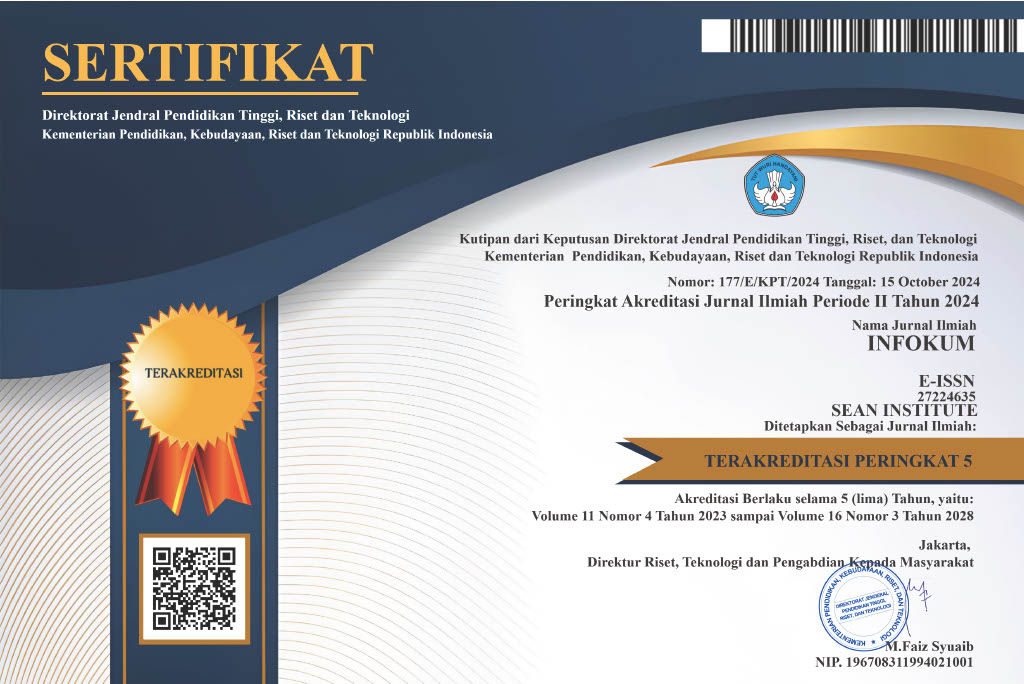The Impact of the Smart Village Program on Community Empowerment in Rural Areas in South Lampung Regency, Lampung Province
Abstract
Village development in South Lampung Regency is still not optimal in empowering its people. As an effort to overcome this problem, the South Lampung Regency Government implemented public policy in the field of technology-based village development with the Smart Village Program. The purpose of the study was to analyze the influence of the Smart Village program on village community empowerment and to identify strategic solutions for the development of the Smart Village program. This study used a mixed method explanatory sequential design approach and SWOT analysis. The results of the study showed that the Smart Village Program had a significant influence on village community empowerment in South Lampung Regency with a significance value of the f test of 0.000, a t test of 0.000, and a coefficient of determination of 0.592 indicating that 59.2% of the variation in village community empowerment can be explained by the Smart Village Program. This is reinforced by the findings of the qualitative approach that the Smart Village Program has a significant contribution in empowering village communities, especially in providing access to information, encouraging active participation, and protecting local values and resources. However, the success of program implementation still varies between villages, depending on the readiness of human resources, coaching facilities, and institutional strengths in each region. The resulting strategic solution recommendations include optimizing digital services, strengthening village capacity and mentoring, reducing inequality through independent initiatives, and ongoing monitoring and evaluation.
Downloads
References
Ary, dan Ananda. (2023). Analisis Pengembangan Komponen Smart Village Di Desa. 5, 28–33.
Aziza, Nurul, dkk. (2023). Metodologi Penelitian 1. Media Sains Indonesia. Halaman 165. https://www.researchgate.net/profile/Nurul-Aziza/publication/371988490_Metodologi_Penelitian_1_Deskriptif_Kuantitatif/links/64a237f095bbbe0c6e08490c/Metodologi-Penelitian-1-Deskriptif-Kuantitatif.pdf
Badan Pusat Statistik Kabupaten Lampung Selatan. (2025). Kabupaten Lampung Selatan Dalam Angka Tahun 2025. Halaman 103. https://lampungselatankab.bps.go.id
Bryson, John M. (2015). Strategic Planning for Public and Nonprofit Organizations. https://www.scribd.com/document/378463708/Bryson-2015
Creswell, J. W. (2021). Research Design : Pendekatan Metode Kualitatif, Kuantitatif, dan Campuran. Pustaka Belajar.
Dimock Michael. (2019). Defining generations: Where Millennials end and Generation Z begins. Pew Research Center. https://www.pewresearch.org/short-reads/2019/01/17/where-millennials-end-and-generation-z-begins/
Ding, Wu., & Li, W. (2022). Digital villages in China: From rural information modernization to rural revitalization. Sustainability, 14(21), 14199. https://doi.org/10.3390/su142114199
Field, A. (2018). Discovering Statistics Using IBM SPSS Statistics (5th ed). Sage. http://repo.darmajaya.ac.id/5678/1/Discovering%20Statistics%20Using%20IBM%20SPSS%20Statistics%20%28%20PDFDrive%20%29.pdf
Ghozali, I. (2013). Aplikasi Analisis Multivariate dengan Program IBM SPSS 21: Update PLS Regresi. Badan Penerbit Universitas Diponegoro.
Giffinger, R., Fertner, C., Kramar, H., Kalasek, R., Pichler-Milanović, N., & Meijers, E. (2007). Smart Cities: Ranking of European Medium-Sized Cities. Vienna: Centre of Regional Science (SRF), Vienna University of Technology.
Indonesia,R. (2019). Peraturan Pemerintah Nomor 12 Tahun 2019 tentang Pengelolaan Keuangan Daerah. Lembaran Negara No. 42.
Julmi. (2020). Metodologi Penelitian. STKIP PGRI Pacitan. Diakses dari https://repository.stkippacitan.ac.id/id/eprint/754/9/nadya%20try%20yulistiawaty_bab%20iii_pgsd2020.pdf
Kementerian Desa Pembangunan Daerah Tertinggal dan Transmigrasi. (2020). Peraturan Menteri Desa, Pembangunan Daerah Tertinggal, dan Transmigrasi Nomor 21 Tahun 2020 tentang Pedoman Umum Pembangunan Desa dan Pemberdayaan Masyarakat Desa. Berita Negara Tahun 2020 No.1633. https://peraturan.bpk.go.id/Details/199685/permendesa-pdtt-no-21-tahun-2020
Labolo, Muhadam. (2022). Memahami Ilmu Pemerintahan : Suatu Kajian Awal. Rajagrafindo Persada.
Liputan6.com. (2024). Metode Survei Adalah: Panduan Lengkap Penelitian Kuantitatif. https://www.liputan6.com/feeds/read/5785980/metode-survei-adalah-panduan-lengkap-penelitian-kuantitatif?page=10
Maharani, Yunita., & Sulistio, Eko. B. (2024). Pengaruh Penerapan Konsep Smart Village. 03(06).
Mangeto, Juan. Kristoven., Brawijaya, U., Administrasi, F. I., & Publik, J. A. (2018). Analisis pengaruh dana desa terhadap pembangunan infrastruktur desa dan pemberdayaan masyarakat desa.
Mardikanto. (2012). Pemberdayaan Masyarakat : Dalam Perspektif Kebijakan Publik. Alfabeta.
Mariyadi, Kanjeng. (2019). Analisis Data Kualitatif Model Miles dan Huberman (Sebuah rangkuman dari buku Analisis Data Qualitatif, Mathew B. Miles dan A. Michael Huberman. https://id.scribd.com/document/692141338/Analisis-Data-Kualitatif-Model-Miles-Dan-Huberman
Marrison. (2017). Metode Penelitian Survei. Kencana. https://books.google.co.id/books?id=LhZNDwAAQBAJ&printsec=copyright&hl=id#v=onepage&q&f=false
Masitah, S. (2019). Dampak tata kelola lokal terhadap pengembangan desa pintar di Indonesia. Jurnal Ekonomi dan Manajemen Perspektif, 18(1), 47–55. https://economics.pubmedia.id/index.php/jpem/article/view/321
Muchson, M. (2017). Statistik Deskriptif. Bogor : Guepedia.
Muin, A. (2023). Metode Penelitian Kuantitatif. CV. Literasi Nusantara Abadi.
Prabawati, Indah, dkk. (2019). Analisis Kebijakan Publik. Unesa University Press
Rangkuti, Freddy. (2017). Analisis SWOT : Teknik Membedah Kasus Bisnis Cara Perhitungan Bobot, Rating, dan OCAI. PT. Gramedia Pustaka Utama










